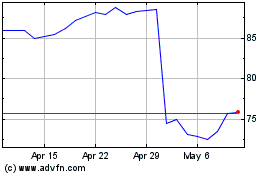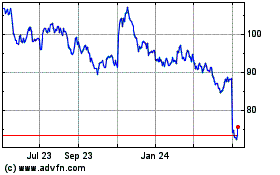Eurozone Finance Chief Criticizes Apple's Response to Tax Ruling
September 04 2016 - 10:30PM
Dow Jones News
CERNOBBIO, Italy—Apple Inc.'s aggressive response to a €13
billion ($14.5 billion) tax ruling by the European Commission shows
the U.S. technology company doesn't understand the moral obligation
on big companies to pay taxes, according to the leader of the
eurozone's finance ministers.
Jeroen Dijsselbloem said Apple had "failed to grasp" the public
outcry over tax avoidance by large companies.
The comments are likely to inflame an increasingly angry
trans-Atlantic dispute about the ruling, which has pitched the
White House against the European Commission and seen the heavily
indebted Irish government resist a €13 billion tax windfall.
"The Apple response shows that they don't grasp what's going on
in society and they do not grasp what's going on in the public
debate," Mr. Dijsselbloem, president of the Eurogroup of finance
ministers, said on the sidelines of the Ambrosetti forum of
business leaders in Italy. "This is a very strong moral issue and
large companies, even if they're this large, can't say 'this is not
about us, there's no problem here.'"
"American companies or any company that uses all these different
tax plans and at the end of the day pays no tax, that's not
fair."
The European Commission ruled last week that Ireland breached
competition law by allowing Apple to pay a tax rate in the
country—where Apple books the bulk of its European profits—that it
said reached 0.005% in 2014. Apple was told to repay the money to
Ireland.
Apple has hit back hard at the ruling, with Chief Executive Tim
Cook warning in a public letter that it threatens to "upend the
international tax system." He also denied the commission's factual
claims. He later told Irish broadcaster RTE that it was reasonable
to discuss both the level of tax and which countries it was paid
to, but "that conversation should be about future taxes, not
retroactive taxes. The EU Commission's overreach in this regard, is
unbelievable to us."
Both Ireland and Apple plan to appeal the commission's ruling.
Apple declined to comment further on Sunday.
John Bruton, who was Irish prime minister for part of the period
covered by the tax ruling, warned that it endangered the country's
ability to provide a stable tax regime for companies. "What's
really threatening is the idea of retrospective tax liabilities on
the basis of reinterpretation of tax rulings by people who don't
have a direct competence," he said.
The White House has also raised concerns that the European
ruling will undermine tax cooperation. But Mr. Dijsselbloem said
there was no need for a transatlantic "tax war," and called for the
strengthening of international standards.
European Commission President Jean-Claude Juncker used a press
conference at the meeting of the Group of 20 large economies in
Hangzhou, China, to deny accusations that the ruling was a
political decision, or aimed at the U.S. "It would be totally
absurd to choose the area of taxation to attack the U.S.," he said.
"We are basing our decisions on facts and the legislation that
applies here." He pointed out that 35 European companies had also
been found in breach of state-aid rules so far this year.
U.S. presidential candidates Donald Trump and Hillary Clinton
have said they aim to reform U.S. taxes on offshore profits to
secure a chunk of the $1.7 trillion in cash estimated by Moody's
Investors Services to be hoarded offshore by American companies.
U.S. corporate taxes are applied only when overseas profits are
repatriated.
Australian Prime Minister Malcolm Turnbull said addressing
corporate tax avoidance is an issue related to resisting
protectionism and isolation taking hold in many nations. "Paying
taxes is not optional. Businesses must pay tax," Mr. Turnbull told
a panel on the G-20 sidelines. It is important for governments to
be able to show that "the people who are making money and doing
well are paying their tax," he said.
Mr. Dijsselbloem is in conflict with the commission over its
ruling in October last year that the Netherlands, where he is
finance minister, offered a sweetheart deal to coffee chain
Starbucks Corp. that amounted to an illegal subsidy. But he said
the case was different, and the Netherlands didn't dispute the
commission's right to ensure fair competition.
Ireland and the Netherlands were at the centre of tax-avoidance
strategies known as the "double Irish" and "Dutch sandwich" used by
multinationals, especially U.S. tech companies.
Valentina Pop and James T. Areddy in Hangzhou, China,
contributed to this article.
Write to James Mackintosh at James.Mackintosh@wsj.com
(END) Dow Jones Newswires
September 04, 2016 22:15 ET (02:15 GMT)
Copyright (c) 2016 Dow Jones & Company, Inc.
Starbucks (NASDAQ:SBUX)
Historical Stock Chart
From Mar 2024 to Apr 2024

Starbucks (NASDAQ:SBUX)
Historical Stock Chart
From Apr 2023 to Apr 2024
